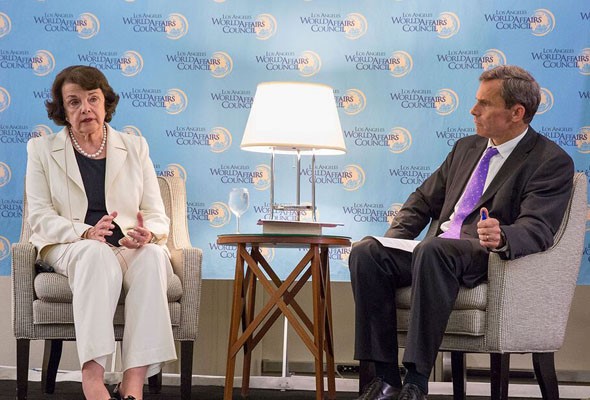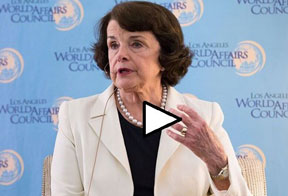 Senator Dianne Feinstein in conversation with Terry McCarthy, President of the Council
Senator Dianne Feinstein in conversation with Terry McCarthy, President of the CouncilSenator Dianne Feinstein said "there is no better deal" on the Iran nuclear issue, called Edward Snowden's actions a "form of espionage" that put American lives at risk, and said that after the recent release of the Senate Intelligence Committee report on torture, "I don't think this will ever, ever happen again." Feinstein spoke to a sold-out Los Angeles World Affairs Council dinner September 2nd and also talked about drones, how politics have changed, and how the position of women in politics has changed over her five-decade long career.
In a lighter moment, when asked if she had her own internet server (like another prominent female politician), Feinstein said, "No!" drawing laughter from the audience.
Speaking on the day that the 34th senator, Barbara Mikulski of Maryland, came out in support of President Obama's nuclear deal guaranteeing its survival, Feinstein said, "It's this or it's nothing. The nothing carries with it a possible breakout of Iran in two to three months and then the response is military. Iran's a big country and you can't really fool around." She said she relied heavily on expertise from Secretary of Energy Ernest Moniz, a nuclear physicist. "Every pathway to a bomb is blocked, the uranium pathway is blocked, the plutonium pathway is blocked, and the covert pathway is blocked," she said. "The conclusion is that this can prevent Iran from moving toward a bomb for 15 years." Asked what happens if the Iranians do cheat, Feinstein said, "I think you judge that by past performance and the tentative agreement which has lasted for over a year and a half has had no violation." But she said the fundamental question is whether Iran can really change. She said she has met Iranian Foreign Minister Javad Zarif and she believes that he, along with President Hassan Rouhani, genuinely want reform. "Fifteen years will tell whether Iran is capable of change or not, and I believe that we have the technical means to know if they're cheating."
Speaking about the monumental 6,700-page Senate Intelligence Committee Report on Torture (still classified) and the heavily redacted 549-page executive summary which was released last December, Feinstein said it was an enormous undertaking that took six years and five full-time staffers on her committee to complete. The findings of the report, according to Feinstein, show issues with accountability. There was a strong reaction to 9/11 and immense pressure on the intelligence community to deliver results. "Everyone was doing everything they could to ferret out who, why, what, what didn't we know, etc.," Feinstein said. She also said the enhanced interrogating efforts the CIA used, which she herself describes as torture, doesn't represent what this country stands for. However "we never found in our work that President Bush knew actually what was going on," she said. "We believe they kept it from him."
Asked about the former NSA contractor Edward Snowden, who leaked large amounts of NSA data in 2013, she said, "I don't respect somebody that takes a job to scrape the system." Raising doubts about his motivations, then she said "interestingly enough he went to China (to Hong Kong) and to Russia," describing it as a criminal act. "I'm sure the Russians would love to have the material as would the Chinese." On the consequences of Snowden's actions, she said "has it created damage? Yes. Has it lost life? I can't be specific but it well could have." When pressed about whether US lives could have been lost, she said "affecting military operations as well as other operations? Affecting assets? No question." She continued to talk about the "moral and ethical code" America needs to follow saying, "we can't lose our way, because we lose our country," to a room of applause.
Asked about drones, Feinstein said, "this whole issue of drones presents a real difficult problem for me because drone warfare could be catastrophic." Drones can fly high, hit with precision, and all anonymously. While many critics of the drone program think it should be entirely transferred from being covertly run by the CIA to transparently run through the Pentagon, Feinstein said she thought the CIA was better suited to conducting done strikes than the military. "This is a program that the CIA does well." Feinstein said it is a careful and considered process. "I watch it like a hawk... I have a big concern about the military using it. Pilots come, pilots go. There's a strike, people move quickly, and collateral damage has been much higher with the military than with the CIA." Another issue is to whom the U.S. sells them. "We have a whole list of nations that want to buy drones now." She said this worried her and should be restricted.
On California, which is facing one of the most severe droughts on record, Feinstein said the senate does not have "a magic rain dance" but she is working with fellow Senator Barbara Boxer on a bill. "I've worked for a year now on a drought bill that might pass," she said of their work together. The bill includes short-term improvements like the movement of water to get it to communities that don't have any. Long-term plans include adding desalination plants, recycling projects, and storage. "It's a little over a billion dollars," she said.
Feinstein talked openly about the earlier years of her five decades in politics. In a pivotal moment in 1978 she thought she might be serving her last term. "I was convinced I was not electable," said Feinstein, who was then president of the Board of Supervisors in San Francisco and had failed in a run for mayor. Feinstein was in her office when SF mayor George Moscone and city supervisor Harvey Milk were shot by a political rival. "It's amazing, this was a long time ago but it's like it was yesterday," said Feinstein. "I heard the door slam, I heard the shots, I smelled the cordite," said Feinstein. "I walked into Harvey's office and found his body and put my finger to get a pulse," but Milk was already dead. It was a "terrible dark day in San Francisco," she said. "This was the first openly gay public official in America - killed by a colleague...the city fell apart." Feinstein subsequently took over as mayor and in 1992 was elected to the U.S. senate.
With a career marked with several female firsts including first woman Mayor of San Francisco, first woman elected Senator of California and first woman to chair the Senate Select Committee on Intelligence, Feinstein was asked how politics has changed and what her advice would be to young professional women. She said politics has changed since she first ran in 1969 in that it is "much more difficult" and "more polarized." But that for women today "the world is your oyster...it was very different before." She recalled people questioning her career choices asking "why are you doing this? You must have a bad marriage. Why aren't you home with a child? That kind of thing," but she said that's all gone now. "Women will support other women and they will contribute to other women and that's all new," Feinstein said to applause.
Asked if she'll run for another term in 2018, Feinstein's reply was succinct, "we'll see."
For Los Angeles Times coverage of the event please click here.

